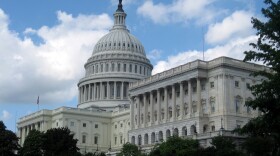Since Republicans took full control of Washington, Central Texas Congressman Lamar Smith has become a leading voice in setting the party's agenda when it comes to science and environmental regulation. But some worry that agenda could have a chilling effect on research and policy.
As head of the House Committee on Science, Space and Technology, Smith made a name for himself challenging widely accepted science on climate change, including subpoenaing researchers and government officials with whom he disagrees.
“Let me to confess to you all, I was the first Science Committee chair in 21 years to issue a subpoena. Twenty-one years ago, a chairman issued one subpoena. In the last Congress, I actually issued 25,” he recently told an approving crowd at a forum of climate science skeptics hosted by the conservative Heartland Institute. “Let me say, I don’t anticipate issuing near that many in the current Congress.”
Smith’s notion that many environmental regulations are based on suspect or nonexistent data is refuted by most in the scientific community. But it’s gained political traction since Trump took the White House. One of his bills that has already passed the House this year requires the Environmental Protection Agency to make new policies based only on research that uses data that’s publicly available.
“In our modern information age, federal regulation should be based only on data that is available for every American to see and can be subjected to independent review,” Smith said at the Heartland Institute event.
It sounds like a modest proposal, but some worry it could have a negative effect on public policy.
Jonathan Samet, who directs the University of Southern California’s Institute for Global Health, says the debate over when to make scientific data publicly accessible was sparked, in part, by two studies about air pollution.
“Both studies showed that living in places with higher air pollution compared to lower increased risk for dying and particularly for some specifics disease like lung cancer and heart disease,” he said.
The findings were powerful enough to help the EPA set new emissions standards. But, because the studies used medical records, the data had to stay secret. Under Smith’s proposal, studies like this might not be useable in the formulation of policy.
“It could affect the translation of research findings, if these requirements for access and documentation have to be met,” Samet said.
Others say that the bill's requirement that scientists publish and maintain their raw data in a public forum could add to the price tag of research.
"There are costs associated with that," said David Allen, a professor of chemical engineering who has served on the EPA's Science Advisory Board. "You need to make sure that those data are properly archived. So preserving data and making them transparent and available to other researchers comes with a cost."
Many environmental groups go further. They worry Smith’s goal is to dismantle the scientific rationale on which many environmental rules are based.
At the Heartland Institute’s forum, Smith agreed with an audience member who said the research undergirding EPA rules should be reevaluated.
“We’re going to be able to accomplish that,” he said. “But as far as the bill goes, none of these regulations can go into effect unless the data is made publicly available. That is a huge disincentive to pass regulations at all.”






